You have taken a test and those two magical lines show up-a positive pregnancy test!
You are excited and nervous at the same time and soon your whole life begins to change.
Most significant to you now is your baby’s normal growth and you want to be super sure about eating right to meet the increased demands.
Before we discuss the nutrition needs for each trimester, let’s see how much should be the ideal weight gain?
- Women who are overweight pre-pregnancy should aim to gain between 7 to 11 kgs during their entire pregnancy. It may be even less depending on the weight when conceived.
- Underweight women can gain anywhere between 12 to 18 kgs.
- Women having normal body weight can increase about 11 to 16 kgs.
First Trimester
Do not eat for two:
Yes you read it right you don’t need to eat for two atleast in the 1st trimester, where your foetus is peanut sized and all the weight is going on the mother. What is of utmost importance for your baby’s growth and your health is not just eating more but eating right! Focus on meeting the micro-nutrient (vitamins and minerals) requirements keeping your caloric intake normal during first trimester.
Have frequent small meals:
Eat after every 2.5-3 hours gap during the first 12 weeks.This helps in meeting the increased nutrient demands and reducing nausea and vomiting.
Nutrients to focus:
Folic acid: Found in beans, citrus fruits, green leafy vegetables ,beetroot, eggs, broccoli, banana, nuts and seeds.
Calcium: Apart from milk and milk products, following foods too are rich and infact better sources of Calcium.
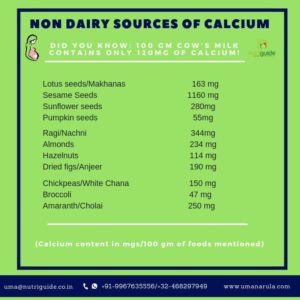
Iron: Apart from eggs,poultry and meat following are other rich sources of iron:
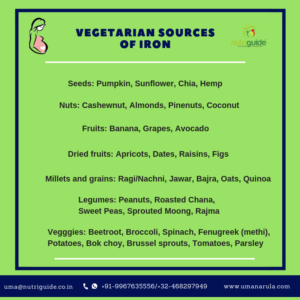
Choline: Found in eggs,tofu,quinoa.
Vitamin B12: Found in meat, poultry, seafood, milk and milk products ,fermented foods like idli,dosa and in mushrooms.
Omega-3 fatty acids: Found in fatty fish, chia seeds, flax seeds and walnuts.
Discomforts
Morning sickness – Nibble small meals instead of larger portions at one go.Here are some additional tips:
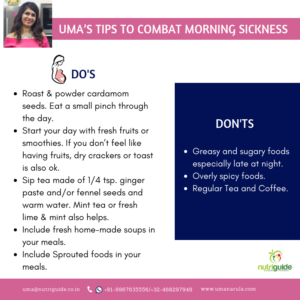
Anaemia – Apart from including enough iron rich foods in your daily routine be sure about iron absorption too. The following tips will help in better iron absorption and combat anaemia.

Tiredness – Happens because of changing hormones that lead to frequent dips in blood glucose levels. Take power naps during the day and go to bed early.Avoid the temptation to eat sweet foods. Instead, give your energy levels a boost by eating snacks based on wholegrains and fruits/vegetables .
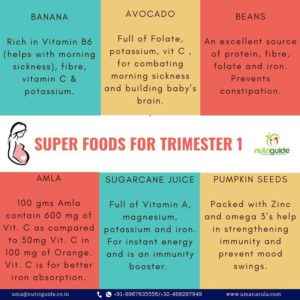
Second trimester
Do not eat for 2
While everyone you know will tell you to ‘eat for two’ do remember that you only need about 300 extra calories during this trimester. Not even one additional burger or packet of chips and you are cross 300 Cal. So focus on more nutrient dense food and not eating for two.
Eat at Right Intervals
Increased intervals between meals lead to acid build up in the stomach – causing acidity and over eating at the next meal. Reduced intervals between meals do not provide enough time for the stomach to digest its food – causing bloating and indigestion.So maintain maximum of 2-2.5 hourly gaps during the 2nd trimester.
Nutrients to focus
In addition to the important nutrients for first trimester include the following:
Magnesium: Found in nuts and seeds, bananas and yoghurt.
Vitamin D: Expose your body to direct sunlight for 20 min/day. Be regular with your supplement as vit D requirements cannot be solely fulfilled by diet.
Discomforts
Heartburn – eating smaller meals and more regular snacks often helps. Avoid eating late into the evening (leave 2 hours between food and bed). Common triggers include rich, spicy and fatty foods, and caffeinated drinks.
Constipation –the increasing size of foetus exerts pressure on the digestive organs leading to indigestion and constipation. Including plenty of whole grains, millets, fruit, vegetables, beans and pulses help. Drinking plenty of fluids and being physically active also helps reduce constipation.
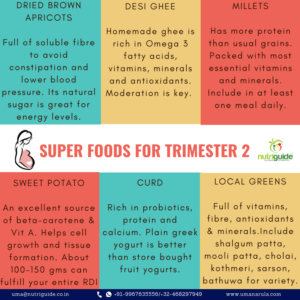
Third trimester
Do not eat for two
You need around 450cal extra in a day. Have an additional chapati or rice serving, extra bowl of dal, green leafy veggies and an extra serving of your snack. An additional teaspoon of desi ghee.This will help in meeting the increased requirements.
Eat at Right Intervals
To avoid frequent heartburn,acidity and constipation a maximum of 2-2.5 hourly gaps during the 3rd trimester must be maintained.
Nutrients to focus
Apart for the nutrients from Ist and IInd trimester ,these are the add ons
Vitamin C – your vitamin C requirements are up an extra 25% this trimester. Including at least one vitamin C-rich fruit a day will help you meet this. Amla,guava,oranges are good sources of vit C.
Vitamin A – include a variety of bright yellow and orange coloured fruits and vegetables and low fat dairy products.
Discomforts
Apart from heart burn,acidity and constipation discussed above, these are additional short term discomforts:
Increased urination – Occurs as the big size foetus exerts pressure on the bladder. But don’t reduce your fluid intake.This short term trouble will end soon.
Swelling (oedema) – Drink plenty of water, keep your sugar and salt intake low.
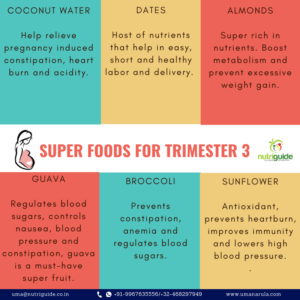
Our Indian diet is quite wholesome by itself, as it comprises all the food groups required to keep you healthy. But you cannot eat one or two healthy meals and expect it to carry you through the day. Here is a break up of all food groups along with their reference intakes.
| Milk & Other Dairy Products | If it suits your body, do include 2 glasses of cow’s milk a day . Other dairy products like dahi, buttermilk, cottage cheese (paneer) are rich sources of protein, calcium, and vitamin B12 try to eat them as often as possible. Aim for a minimum of 3 to 4 servings of dairy products. |
| Dals, Pulses & Nuts | For pure vegetarians, you need 6 portions of these protein rich foods throughout the day. 1 portion is roughly equal to 30 gms or a small katori. |
| Cereals & Whole Grains | Rich in iron, selenium, magnesium, fiber, B-Complex vitamins (including B1, B2, folic acid, and niacin) grains like whole wheat, oats, barley, corn, and rice support all your growing baby needs. Grains also help the placenta grow. Include millets in breakfast or lunch. |
| Fruits & Vegetables | Fruits and vegetables provide fibre, vitamins and essential minerals. A minimum of 3 servings of fruits and 5 serving of vegetables is necessary. |
| Fats & Oils | Fats are an important source of energy and they will help your pregnant body absorb nutrients better. Essential fatty acids like Omega 3 are vital for your baby’s brain and central nervous system throughout pregnancy.
Balanced intake of fats has been known to prevent premature birth. It also helps increase birth weight. Fats and oils also prepare your body for childbirth. Avoid refined oils and try to add pure filtered oils like mustard oil, sesame oil and coconut oil. Solid fats like home made butter and ghee also contain essential fatty acids that are required during pregnancy. |
| Water & Other Liquids | If you get bored of drinking plain water, try water infused with fresh fruits, lemons or mint leaves. Nariyal Pani is a great addition to your pregnancy diet . |
Foods to avoid and limit:Certain foods pose serious risks or harbour harmful bacteria that could potentially affect your child for the rest of their life.
Alcohol-There is no safe limit of consuming alcohol during pregnancy. Research relates its consumption with birth defects and hence it is to be strictly avoided.
Processed foods-The healthiest of processed foods are unhealthier than the calorie densest natural food. Confused?? Simply put; The health quotient of food is judged by its nutrients and not merely the calories. Processed foods are loaded with preservatives, artificial colours & flavours, additives and chemicals. These components harm the delicate metabolic balance in the body, resulting in hormonal imbalances and may have adverse effects on your little one too.Limit the following for sure!
- Colas, canned juices, juice mixes, flavoured drinks.
- Packaged chips and mixtures.
- Commercial breads, buns, biscuits, cookies, cakes, pretzels
- Packaged ketchup, sauces, salad dressings.
- store-bought muesli, oatmeal biscuit and fortified juice.
- Canned food.
- Caffeine.
The immune system during pregnancy gets weakened. So its better to avoid following foods that have high chances of harbouring pathogenic bacteria causing infections.
- Soft, unpasteurized cheeses (often advertised as “fresh”) such as feta, goat, Brie, Camembert, and blue cheese.
- Unpasteurized milk, juices, and apple cider.
- Raw eggs or foods containing raw eggs, including mousse and tiramisu.
- Raw or undercooked meats, fish, or shellfish, sushi.
- Processed meats such as hot dogs and deli meats (these should be thoroughly cooked).
- Fish that are high in mercury like sword fish,mackerel.
- Raw Sprouts.
- Tap Water.
For customised Nutrition Plans for pregnancy visit www.umanarula.com.
Follow us on fb https://www.facebook.com/UmaNarulaNutriguide/ for regular tips on health,wellness,eat right and much more.
Uma Narula is an award winning practising Nutritionist since 12 years.If you have any queries regarding your health,weight loss and nutrition you can email at uma@nutriguide.co.in or call on +91 99676 35556 / +32 468 29 79 49.
